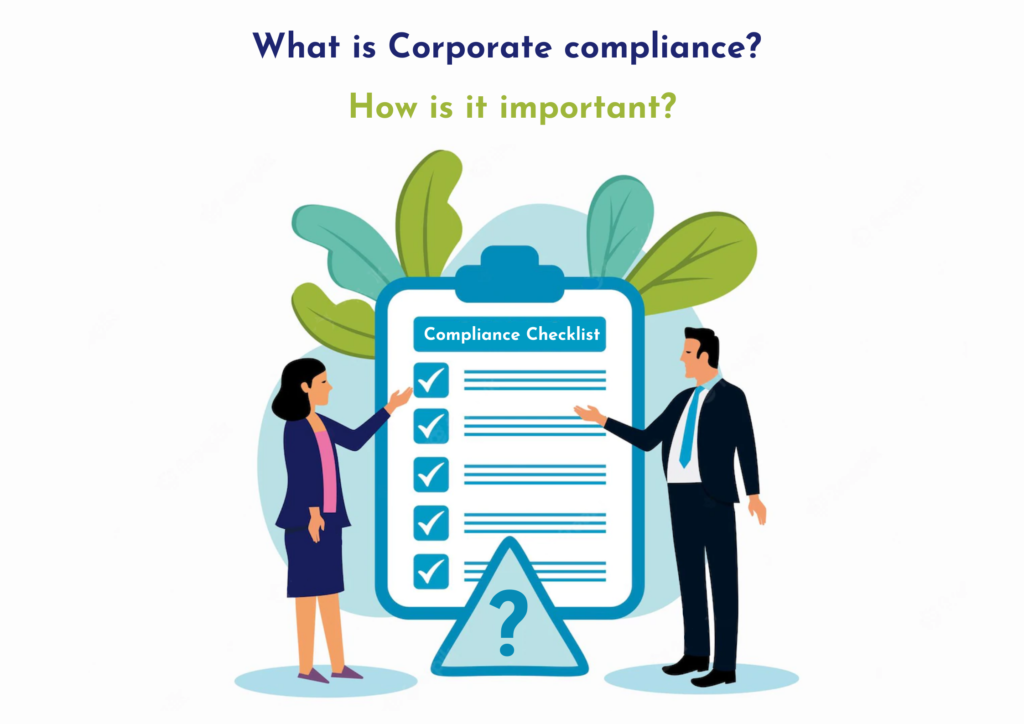Corporate Compliance:
Compliance is “the action of complying “or “the state of meeting rules or standards.” In the corporate world, it is said as the process of making sure the company and employees follow all laws, regulations, standards, and ethical practices that apply to the organization and industry.
Corporate Compliance in a Business:
Corporate Compliance refers to how organizations follow all the rules, regulations, and policies that apply to the business in all compliance aspects. It usually involves designing, implementing, and monitoring all practices, procedures, and training.
Corporate Compliance Policies:
Corporate Compliance has internal policies and procedures; enforcing Compliance helps, the company prevent and detect rule violations, protecting the organization from fines and lawsuits. It is also defined as making the company and employees cover corporate Compliance, internal policies, and procedures. Organizations aid in establishing the compliance policies consistently and accurately, which governs their compliance policies.
Corporate Compliance and its regulation:
Corporate Compliance covers internal and external Compliance with regulations and government laws. In external Compliance, it is enlisted how the business follows the compliance law. But corporate Compliance extends to a company, designing its internal compliance structure and policies. Enforcing corporate Compliance means obeying rules and regulations and preventing violations and noncompliant acts, like tax evasion or fraud, which cause an organization to incur fines or litigation, which is a part of compliance services.
Incorporating Corporate Compliance How is it useful.
Corporate Compliance is the formal policies that prevent violations of Corporate Law Compliance, provide training on relevant regulations, implement compliance procedures, and monitor violations. Without these elements, every company is prone to risk and legal liability. Although the types of compliance policies appropriate for a specific company, which varies as per its size and complexity of operations, whether large or small, benefit from having effective corporate compliance in place, provided it is well designed and actively monitored from time to time.
Purpose of a Corporate Compliance?
The corporate Compliance integrates the compliance efforts enterprise-wide, from managing external regulations and internal policies to comprehensive employee training. The Compliance improves communication between the employer and the employee. It includes a process for creating, updating, distributing, and tracking compliance policies.
Maintaining compliance policies moulds the employees to do their jobs well and reach their career goals. In turn, the company can achieve its goals and grow faster. The Code of Conduct, Compliance Standards and Policies, and Procedures are three vital components of Corporate Compliance.
Code of Conduct:
The company’s Compliance is established by the code of conduct, which sets the ethical principles of the business along with the general principles used in which the employees and the management conduct operations.
Compliance Standards and Policies:
The compliance standards and policies govern the rules and expectations for each crucial corporate compliance area for the compliance service providers.
Compliance Procedures:
The compliance procedures frame the day-to-day practices and requirements for the proper implementation, management, and enforcement of the compliance standards and policies.
Compliance Monitoring and Auditing:
With compliance monitoring and auditing, it becomes easier to enforce the compliance objectives and even to know whether the compliance policies are being adhered. These policies are catered to identify and address the concerns and gaps in Compliance regularly and consistently. On the other hand, auditing reviews the entire picture of a company’s Compliance from time to time, whether weekly, monthly, quarterly or annually.
How to Maintain Corporate Compliance?
Compliance officers maintain their corporate Compliance through several means:
1. Companies must adopt policies and procedures to fulfill their regulatory obligations.
2. Companies must manage their compliance policies to assess their performance regularly to ensure it works well. This involves testing controls, auditing employees’ adherence to policy and procedure, reviewing reports, and more.
3. Compliance officers must also perform risk assessments at regular intervals.
Assessments include reviewing the regulations that are prone to the company and its business activities in compliance service providers.
Wrap-up:
Talentpro makes enlisted corporate compliance which takes over the compliance policies governed by the compliance officers maintained efficiently at its less of a company’s risk and ethical posture of the Compliance, which preserves the company’s reputation.









